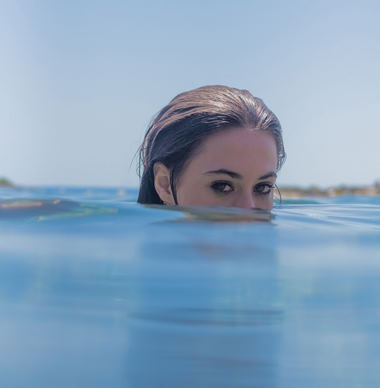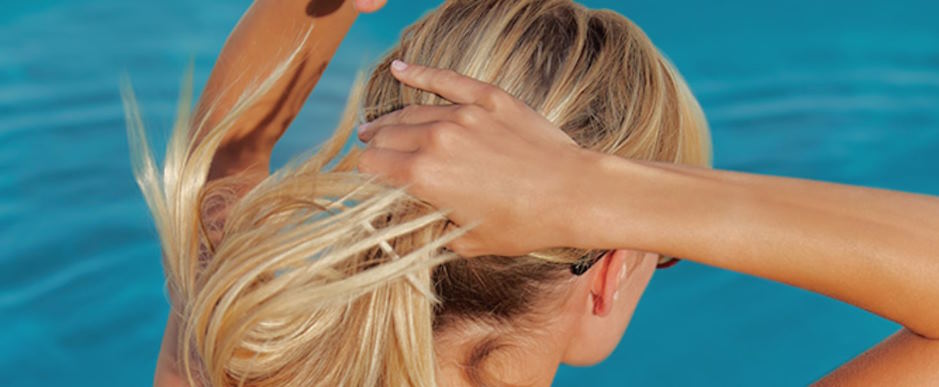Summertime means fun in the sun and plenty of opportunities to cool off in the pool or ocean. However, while swimming can be a refreshing way to beat the heat, it can also take a toll on your hair. Chlorine and saltwater can strip your hair of its natural oils, leaving it dry, frizzy, and prone to damage. Additionally, prolonged exposure to these elements can cause color fading and weaken hair cuticles. But fear not! From pre-swim hair care routines to post-swim treatments, we’ve got you covered with practical advice to help you keep your locks healthy and luscious, no matter how much time you spend in the water. So, dive in and let’s protect your hair from the damaging effects of chlorine and saltwater!
Pre-Swim Hair Care Routine: Keeping Your Locks Safe in the Water
Taking proactive measures to protect your hair before you take a dip in the pool or ocean can go a long way in safeguarding it against chlorine and saltwater damage. Here are some essential tips for your pre-swim hair care routine:
 Wetting hair with clean water before swimming: Before you jump into the water, wet your hair with clean water from a shower or a hose. This helps to saturate your hair with fresh water, reducing the amount of chlorine or saltwater it can absorb. Wetting your hair beforehand can also prevent dry hair from soaking up chemicals, minimizing damage.
Wetting hair with clean water before swimming: Before you jump into the water, wet your hair with clean water from a shower or a hose. This helps to saturate your hair with fresh water, reducing the amount of chlorine or saltwater it can absorb. Wetting your hair beforehand can also prevent dry hair from soaking up chemicals, minimizing damage.- Applying a leave-in conditioner or oil to coat hair strands: Applying a leave-in conditioner or oil, such as coconut or argan oil, to your hair before swimming can create a protective barrier. These products can help to coat your hair strands, forming a barrier that helps to repel chlorine or saltwater, keeping it from penetrating the hair shaft and causing damage.
- Tying hair up or wearing a swim cap: Tying your hair up in a bun or wearing a swim cap can provide an additional layer of protection. It can help to minimize hair’s exposure to chlorine or saltwater, preventing them from coming into direct contact with your hair. Swim caps can also help to keep your hair dry and reduce the amount of water your hair absorbs.
- Using a clarifying shampoo after swimming to remove chlorine and saltwater residue: After swimming, it’s crucial to use a clarifying shampoo to remove any chlorine or saltwater residue from your hair. Clarifying shampoos are formulated to remove build-up and can effectively cleanse your hair from any lingering chemicals. Be sure to follow up with a moisturizing conditioner to replenish moisture and nourish your hair.
During-Swim Hair Care Tips: Nurturing Your Hair While in the Water
While you’re enjoying your time in the pool or ocean, it’s important to take care of your hair to minimize the potential damage from chlorine and saltwater. Here are some helpful during-swim hair care tips:
- Rinsing hair with clean water after swimming: After swimming, rinse your hair thoroughly with clean water as soon as possible. This helps to flush out chlorine or saltwater from your hair, preventing it from lingering and causing damage. Rinsing your hair immediately can also help to minimize the amount of time chlorine or saltwater has to penetrate your hair shaft.
- Avoiding hair products with alcohol or sulfates: When swimming, it’s best to avoid using hair products that contain alcohol or sulfates. These ingredients can strip your hair of its natural oils, leaving it more susceptible to damage from chlorine or saltwater. Opt for gentle, sulfate-free shampoos and conditioners, and avoid hair sprays or gels that contain alcohol.
- Limiting use of heated styling tools on swim days: Chlorine and saltwater can already cause your hair to become dry and brittle, so it’s best to avoid using heated styling tools on swim days. Heat can further damage your hair and exacerbate the effects of chlorine or saltwater. Embrace natural hairstyles or use heat-free styling techniques like air-drying or braiding on swim days.
- Brushing hair gently to avoid breakage: Brush your hair gently with a wide-toothed comb or a brush with soft bristles to avoid breakage. Wet hair is more vulnerable to breakage, so be extra careful when brushing after swimming. Start from the ends and work your way up, detangling your hair slowly and patiently to avoid causing damage or breakage.
Post-Swim Hair Care Routine: Restoring Your Hair’s Health and Vitality
After a swim in the pool or ocean, it’s crucial to give your hair some extra care to replenish moisture, repair damage, and maintain its health. Here are some essential post-swim hair care tips to include in your routine:
- Using a moisturizing shampoo and conditioner: Look for a moisturizing shampoo and conditioner specifically formulated to hydrate and nourish your hair. These products can help to replenish the lost moisture and restore the natural balance of your hair after exposure to chlorine or saltwater. Be sure to thoroughly rinse your hair to remove any residual chemicals.
- Deep conditioning hair to restore moisture and repair damage: Deep conditioning treatments can work wonders for post-swim hair care. Choose a deep conditioner that is rich in hydrating and repairing ingredients, such as keratin, argan oil, or shea butter. Apply it generously to your hair and leave it on for the recommended time to allow it to penetrate deeply and restore moisture and repair any damage caused by chlorine or saltwater.
- Applying a hair mask or oil treatment: A hair mask or oil treatment can provide an extra boost of hydration and nourishment to your hair. Look for masks or treatments that are specifically formulated for damaged or chemically treated hair. Apply it to your hair and leave it on for the recommended time to help restore the moisture balance, repair damage, and strengthen your hair.
- Avoiding tight hairstyles that can cause hair breakage: After swimming, avoid tight hairstyles that can cause hair breakage. Wet hair is more vulnerable to breakage, and tight hairstyles like ponytails or buns can put additional stress on your hair, leading to breakage or damage. Opt for loose hairstyles that minimize tension on your hair, such as loose braids or gentle updos.


